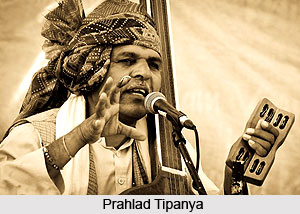 Prahlad Tipanya is a million dollar voice who has taken a plunge into singing Kabir Bhajans and explaining the deeper meanings of the same in Malwa region of Madhya Pradesh. Prahlad is increasingly recognized as a remarkable exponent of Kabir`s music and meanings, took to the stage at Asia Society headquarters, expounding on some of Kabir`s best-known poetry and playing the Tambura (a five-stringed plucked and strummed instrument originally from Rajasthan), and kartal (a percussion instrument played with the fingers of the left hand).
Prahlad Tipanya is a million dollar voice who has taken a plunge into singing Kabir Bhajans and explaining the deeper meanings of the same in Malwa region of Madhya Pradesh. Prahlad is increasingly recognized as a remarkable exponent of Kabir`s music and meanings, took to the stage at Asia Society headquarters, expounding on some of Kabir`s best-known poetry and playing the Tambura (a five-stringed plucked and strummed instrument originally from Rajasthan), and kartal (a percussion instrument played with the fingers of the left hand).
Early life of Prahlad Tipanya
Prahlad Tipanya was born in the small village of Lunyakhedi, District Ujjain, in 1954. His parents, Atmaramji and Sampatbai Tipanya, were unfortunate, meagre and unlettered. After going to live with his maternal grandparents in Manpur, near Indore, he was successful in school and advanced to an M.A. in History, after which he became a government schoolteacher. Today he is Headmaster at Kanasiya Middle School for Girls.
The year as marked by calendar was 1978, when at the age of 24; Prahladji first heard and was instantaneously captivated by the sound of the tambura, a 5-string plucked instrument. By profession he was a village schoolteacher, and singing obviously never seemed to run in his family tradition. However this incident defined his life anew afresh defining changing the course of his journey. Through the tambura, Prahladji encountered the planet of Kabir. The language of this fifteenth-century saint-poet is sung in village after village by hundreds of bhajan mandalis, whose members have kept alive a continuous oral tradition of singing Kabir`s poetry for 600 years. Prahladji entered this world of all-night bhajan sessions as a learner. Over three decades later he is a household name, his cassettes and CDs heard in myriad public and private places. Many concede him as having powerfully contributed to a resurgence of Kabir oral traditions and music in Malwa.
Career of Prahlad Tipanya
Prahlad Tipanya combines a powerful singing style with a magnetic ability to communicate with his audiences. His concerts are more than entertaining music. They are deep engagements with the spiritual and social thought of Kabir. In Malwa he is not only admired as a singer, but also revered as one who propagates, with great personal intensity and engagement, the messages of Kabir. His concerts stress the need to rise above petty divisiveness, sectarianism, empty ritualism and hypocrisy, and the need to adopt love as the ultimate religion.
Unswayed by the trends of mixing filmy tunes and synthetic sounds in folk music, Prahladji has resolutely nurtured a Malwi folk music idiom. A new sound he is responsible for introducing is that of the violin, which has now become a trend for bhajan mandalis of his area. He performs with his troupe, that includes accompanying singers and instrumentalists playing manjira, dholak, Harmonium, timki and Violin. Prahladhji himself plays the tambura and kartal.
Prahlad Tipanya has performed for audiences at local, state, national and international levels. Since 1980 his voice has been heard on All India Radio stations in Indore, Bhopal, Jabalpur, Patna, Lucknow and Kanpur. He has also been a frequent artist on Doordarshan. In 2003 his troupe performed in London, and then toured the US for over two months. In 2005 he went to Pakistan, and in 2009 there was another two-month tour of Canada and the US. His awards include Malwa Ratna, Shrestha Kala Acharya, Isuri Samman, Bhajan Bhushan, Madhya Pradesh ka Shikhar Samman, the Sangeet Natak Academy Award and most recently the Padma Shri Award.
In 1997, Prahlad Tipanya set up the Kabir Smarak Seva Shodh Sansthan (Kabir Memorial Service and Research Institute), on a plot of land granted to him by the state government adjoining his home in Lunyakhedi village. This registered trust organizes an annual event, where thousands congregate to listen to Kabir`s words through bhajans and discourses by gathered singers and spiritual leaders. A school is opening in 2011; further plans include a library of Kabir-related writings and a meditation hall.
Prahlad Tipanya acknowledges the teaching and guidance of Shri Chenaji Maru, from whom he learned to sing Malwi folk bhajans as a young man. He also acknowledges his spiritual gurus, including Bhimpuri Maharaj (Nath Sampraday), Charan Singh Maharaj (Radha Soami), Griddhmuni nam sahib (Kabir Panth), and Abhilash Sahib, Jyotidas Shastri, Vivekdasji Acharya, Ramjivan Shastri, and Purshottam Sahib, along with the guidance of many other sants and acharyas.




















